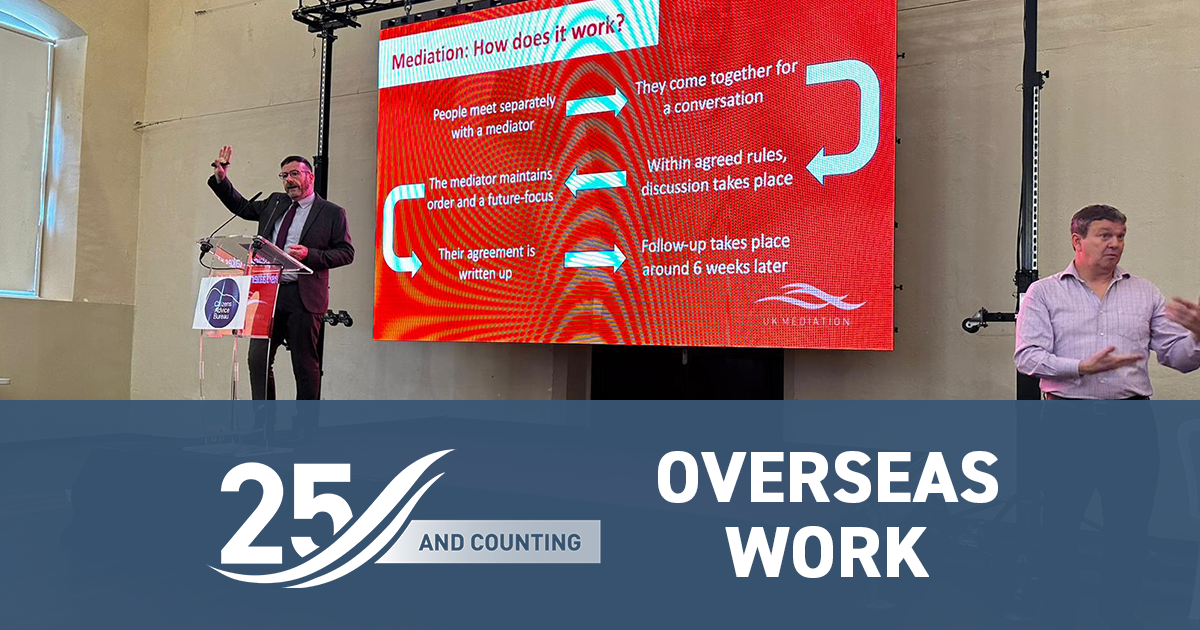
Posted on: May 20th, 2024

To celebrate our 25th Anniversary this year, we sit down with Founder, Dr Mike Talbot, to look back at some of the key moments in UK Mediation's history.
In the fifth entry of this series, we take a look at some of the overseas work that UK Mediation has carried out over the years.
1. When and what was the first piece of overseas work for UK Mediation?
Dr Mike Talbot: Right back in the early noughties, we were asked to help some organisations in Gibraltar to set up their own in-house mediation provision. One of the early ones was Gibraltar Citizens Advice Bureau (CAB), who wanted to be able to offer Gibraltarians a quicker and less formal means of resolving disputes. Their focus was on family work and with employment disputes, and a particular interest was around the high incidence of workplace discrimination claims with North African workers crossing the Strait to find work in Gibraltar. We trained an initial cohort of CAB workers, but then we also picked up a lot of trainees from the Fire Service, the Police Authority, the NHS, and the Customs Authority. We are still in touch with our friends at the CAB, and in fact were invited to an anniversary event just recently, where I was privileged to address a very large gathering of people who are all connected to the CAB’s work.
Since that time, we have worked with partners all around the globe: from me being appointed the ‘Long-Term Expert’ with the Jordanian judiciary who were setting up a mediation centre in Amman, to working with groups of Nigerian lawyers, setting up in-house mediation schemes in Sweden, working with government bodies in far-flung St Helena, and much more.
2. Are there specific types of overseas organisations that mediation services and training may be of more benefit to?
MT: We would of course argue that mediation services and training are beneficial to all organisations, but we have tended to get the most interest from government bodies (who are usually large employers), health providers (ditto) and technical/scientific establishments. I think, in the latter case, the people are highly trained and experienced, are very good at their jobs, and the employer is very keen to retain them if possible. Given that people will often leave a job if they have a lengthy unresolved dispute with a colleague, it is in the employer’s interests to do all they can to help resolve such conflict, which is where our expertise comes in.
We have been highly successful in these projects, and have supported resolution of all kinds of interpersonal disputes which, had they been left unresolved, would quite likely have meant losing a valued employee, with all the expense, delay and distraction that goes with it.
3. Why is it that these organisations want to work with UKM, as opposed to providers who are perhaps more local to them?
MT: When we are approached by overseas organisations, if they have been shopping around locally, all they may have come across are law firms offering their own brand of mediation. And while there is a place for lawyer-led Alternative Dispute Resolution, what the organisation is looking for is not deal-making, evaluative processes, which tend to be the offering from a lot of legal practitioners, but more the kind of dialogue-building interpersonal service that we are able to offer.
So, we often start with a couple of calls, or a visit, to help the organisation to understand that our offering is rather different to what they may have come across locally. And, of course, our offering is mostly in English (although we do have some speakers of other languages who we call on), and organisations who approach us tend to be multinationals, whose lingua franca is also English.
4. In your experience, what are the main differences of delivering cases and courses to groups in and outside the UK?
MT: In truth, there are more similarities than differences, but the main contrast that we do find is how (un)familiar our overseas clients are with mediation. In the UK, we are now fairly used to mediation: people understand more or less what it is and know what it can offer them. A lot of overseas partners, however, may be coming across mediation for the very first time or, if they have already encountered it, it would have been offered as something very similar to conventional legal practice. So it is always a joy, whether in training courses or when providing mediation services, to get the ‘A-Ha!’ moments when people realise that we are actually offering something a bit different, especially when they start to appreciate just how powerful it can be.